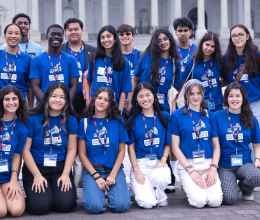
Gay‐Straight Alliances, or GSAs, are student‐led and student‐organized school clubs that aim to create a safe, welcoming, and accepting school environment for all youth, regardless of sexual orientation or gender identity. While school administrators sometimes balk at allowing students to start GSAs, federal law guarantees that students at public high schools have the right to do so. Here are the list of the most common objections to GSAs, and how to combat them:
1. “We can’t let our students have a club that’s about sex.”
GSAs are NOT about sex. GSAs are about valuing all people regardless of whether they’re gay, straight, bisexual, transgender, or questioning. Like any other club, GSAs offer students with a common interest a chance to connect and give students a respite from the day-to-day grind of school. They’re about creating a supportive space where students can be themselves without fear and making schools safer for all students by promoting respect for everyone. A GSA meeting is no more about sex than the homecoming dance or any other school-sponsored activity. And several federal courts have ruled in favor of GSAs when schools have used this as an excuse to try to stop them from forming.
2. “We can’t let outsiders come in and start this kind of club in our school.”
Outsiders don’t form GSAs. GSAs are started and led by students. While there are a couple of organizations that have tried to create contact lists or loose coalitions of the over 4,000 GSA clubs, across the country, GSAs aren’t chapters of some larger organization. There is no big, evil national GSA conspiracy out there trying to get its hands on the youth of America. And according to the federal Equal Access Act, students can start any kind of non-curricular club at their schools that they want.
3. “It’s just too controversial.”
Sure, a GSA may be controversial, but it’s illegal for schools to use that as excuse to silence them. If other students, parents, or community members are in an uproar over a GSA, the school’s responsibility is to address those people’s concerns – not shut down a group that is peacefully doing its thing just because some people don’t like it. Besides, when a GSA becomes a point of contention in a community, it really only proves the need for the GSA to exist in the first place. And again, several federal courts have ruled in favor of GSAs when schools have used this as an excuse to stop them from forming.
4. “If we let students start a GSA, then we’d have to let students form any other kind of club they want. What if they wanted to start a KKK club?”
If a club’s purpose is to harass or intimidate other students, then the club is disruptive to the educational process and the school can stop it from forming – so this kind of argument just doesn’t fly. Letting students start a GSA doesn’t mean all those other crazy sorts of clubs some school say they’re so scared of are going to materialize out of thin air. Have a lot of students been approaching your school about starting a KKK club? We doubt it!
Click here to learn more about GSAs, and how to start one in your own school.






